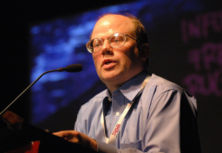Larry Sanger
| Lawrence Mark Sanger | |
|---|---|

| |
| Website | www.larrysanger.org |
| Born | 16th July 1968 Bellevue, Washington, USA |
| Occupation | Editor-in-chief of Infobitt |
Lawrence Mark Sanger (born July 16, 1968 in Bellevue, Washington) is an American philosopher and the founder of various online ventures. He was the co-founder and chief organizer of the encyclopedia Wikipedia, having been the editor-in-chief of its predecessor, Nupedia, and he was the founder and first editor-in-chief of Citizendium. He is the current editor-in-chief of Infobitt.
Although born in Washington State, Sanger was raised in Anchorage, Alaska. He received his B.A. in philosophy from Reed College in 1991 and Ph.D. in philosophy from Ohio State University in 2000.
Encyclopedias
Nupedia
The first online encyclopedia Sanger was involved in was the web-based Nupedia, which he conceptually developed starting in January of 2000. The project lasted until September 2003, when it failed due to inadequate support. Sanger was its salaried editor-in-chief until March 1, 2002, but was a volunteer editor a month prior to his resignation.
Nupedia was written and reviewed by both subject matter experts and the public-at-large although final approval of content required the approval of an expert. It was not a wiki in the modern sense, in which anyone with access to the Internet could contribute content; although anyone could sign up for an account and comment on the articles. At the end of the project, it became a feeder for Wikipedia, and although the projects were intended to be cooperative, they were not.
Wikipedia
Co-founded by Jimmy Wales and Sanger, Wikipedia is a wiki-based project in which content could be contributed and edited by anyone at all. In the start of the project, Sanger had no "official title", but assumed the position of its salaried "chief organizer". Sanger left this position at Wikipedia at the same time he left Nupedia.
On December 31, 2004, a well-known and controversial online essay was published at Kuro5hin[1] in which Sanger detailed "Why Wikipedia Must Jettison Its Anti-Elitism", and that "Wikipedia does have two big problems." The problems he was referring to were the lack of public perception of credibility, particularly in areas of detail, and the dominance of difficult people, trolls, and their enablers. He identified "anti-elitism, or lack of respect for expertise" as the root of these problems.
Citizendium

Hoping to build upon his experience with the earlier encyclopedias and to avoid their pitfalls, Sanger publicly launched Citizendium in March 2007, although it had been a private pilot project that began in September 2006. Originally conceived to be an improved fork of Wikipedia, a consensus was reached to develop an individual sense of identity. This was accomplished by cleaning up or removing articles originally forked in an effort called "The Big Delete."
The three main differences between the Citizendium and Wikipedia are:
- all contributors must apply for membership in the project under their real names
- all articles are reviewed by experts in their particular fields, offering suggestions and criticism as the articles evolve with the goal for each article to be "approved"
- that vandals, trolls, and disruptive editors are quickly and permanently banned from further work on the project.
Other projects
Infobitt
In 2013, Sanger launched a new crowd-sourcing project entitled Infobitt, a news aggregator which aims to gather high quality content in one site.[2] In a break from the past, the project will not involve the wiki markup language.[3]
References
- ↑ "Wikipedia does have two big problems, and attention to them is long overdue. These problems could be eliminated by eliminating a single root problem." Sanger, Larry (31 Dec 2004). Why Wikipedia must Jettison Its Anti-Elitism. Kuro5hin.org. Retrieved on 2007-05-29.
- ↑ Infobitt. Retrieved on 16 September 2013.
- ↑ Morris, Kevin. Wikipedia cofounder Larry Sanger on his next revolution, The Daily Dot, 13 February 2013. Retrieved on 16 September 2013.